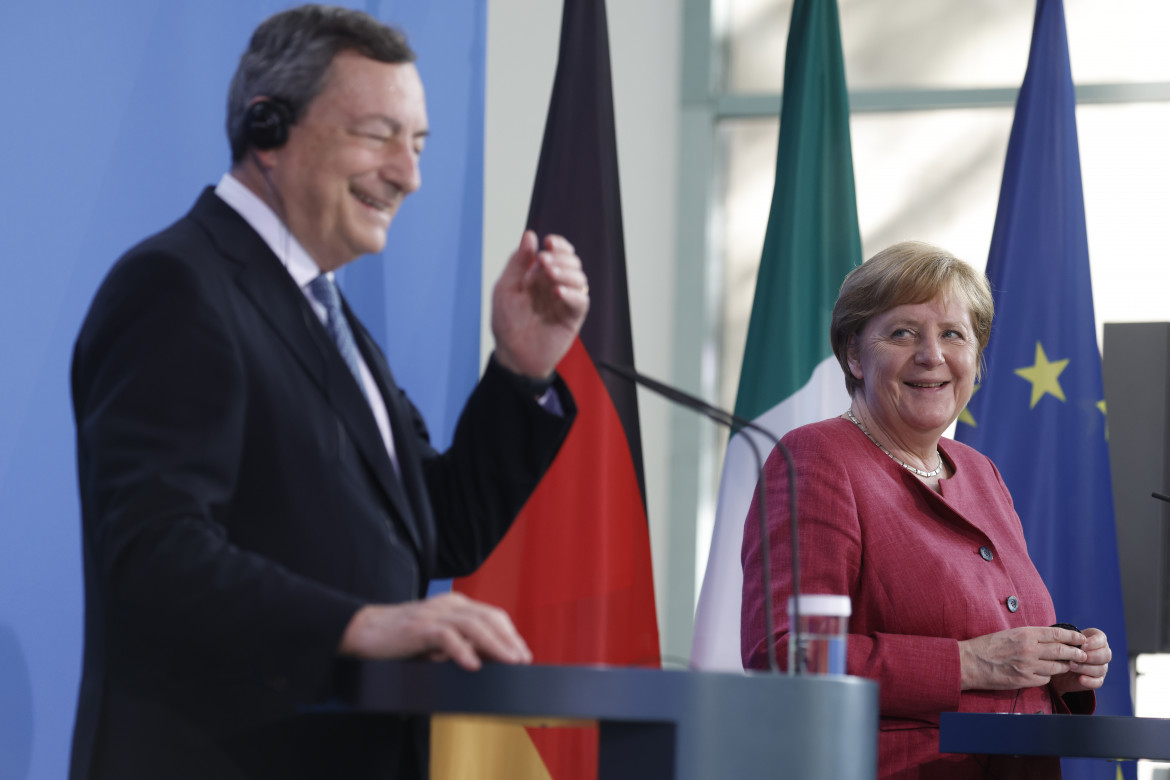Analysis
Draghi and Merkel agree on the need for a new migrant deal with Turkey
Italy favors renewing the agreement with Turkey on migration, the Italian Prime Minister confirmed. And after Turkey, the same agreement will be proposed to other countries as well, starting from Libya, Tunisia and Morocco.

In their meeting on Monday in Berlin, Mario Draghi and Angela Merkel agreed on one thing, more than anything else: the need to arrive at a model of migrant management that would involve the countries of origin and transit and would be less and less of a burden on Europe. This is what the two European leaders have called the “external dimension” of migration, a euphemism that is increasingly used to describe the strategy with which the European Union aims to stop the flow of those who cross the Mediterranean.
It is no coincidence that on Monday, Draghi himself confirmed the willingness of the Italian government to re-propose what is considered the “textbook model,” the 2016 agreement with Turkey for which the German chancellor was mainly responsible, and which the Italian Prime Minister—having apparently forgotten the label of “dictator” that he had put on President Erdogan just three months ago—is now proposing and claiming as his own, almost as a passing of the torch between the two in the role of leaders of the European Union.
Italy favors renewing the agreement with Turkey on migration, the Italian Prime Minister confirmed at the end of the German summit. And after Turkey, the same agreement—money in exchange for tightened borders—will be proposed to other countries as well, starting from Libya, Tunisia and Morocco.
The money is there, and it’s a considerable sum: €8 billion, equal to about one-tenth of the €79.5 billion that the European Commission has allocated for the management of partnerships with third countries. Of these, it is plausible that at least €6 billion—the same figure that was agreed five years ago—will be allocated to Ankara, but the financial commitment is destined to grow. Draghi said so in clear terms, indicating the direction in which Brussels must move: what was needed, he explained, was a greater EU presence in North Africa, not only in Libya and Tunisia, but also in the Sahel, Mali, Ethiopia and Eritrea. He said the EU needs to increase its presence economically.
It will soon become clear just how much this will happen, starting from Wednesday, when the second international conference on Libya will be held in Berlin. On this point as well, Merkel and Draghi were careful to underline their convergence of views: They support the Berlin process, which should be supported by the EU, not just individual countries, Draghi said, receiving in return Merkel’s thanks for Italy’s work toward a political solution in Libya.
All well and good, then? Actually, no. The results achieved on Monday will be at the center of discussions at the European Council on Thursday and Friday. Draghi wants to use those days to discuss immigration alone—but they will also be the only common point of agreement among the 27 leaders. On the rest, the distances between their positions remain astronomical, starting from the issue that is closest to the heart of the Prime Minister: the relocation of those who land, not only in Italy, but also in Spain, Greece, Malta and Cyprus, the countries bordering the Mediterranean and which are most affected by the migration phenomenon.
This is a point on which the other countries aren’t even willing to discuss—Germany included, all the more so in view of the coming elections. To the point that Draghi was forced to admit that regarding relocation, the negotiations will take time.
And the German Chancellor didn’t miss the opportunity to point out that Italy and Germany have different priorities, with Italy being a country of arrival and Germany affected by subsequent migrations. She was referring to the so-called “Dublinants,” migrants who, after landing in Italy, move on to Northern Europe. Now, Berlin—and also Paris—are insisting that Italy should take them back.
Originally published at https://ilmanifesto.it/migranti-accordo-con-merkel-per-un-nuovo-patto-con-la-turchia/ on 2021-06-22
